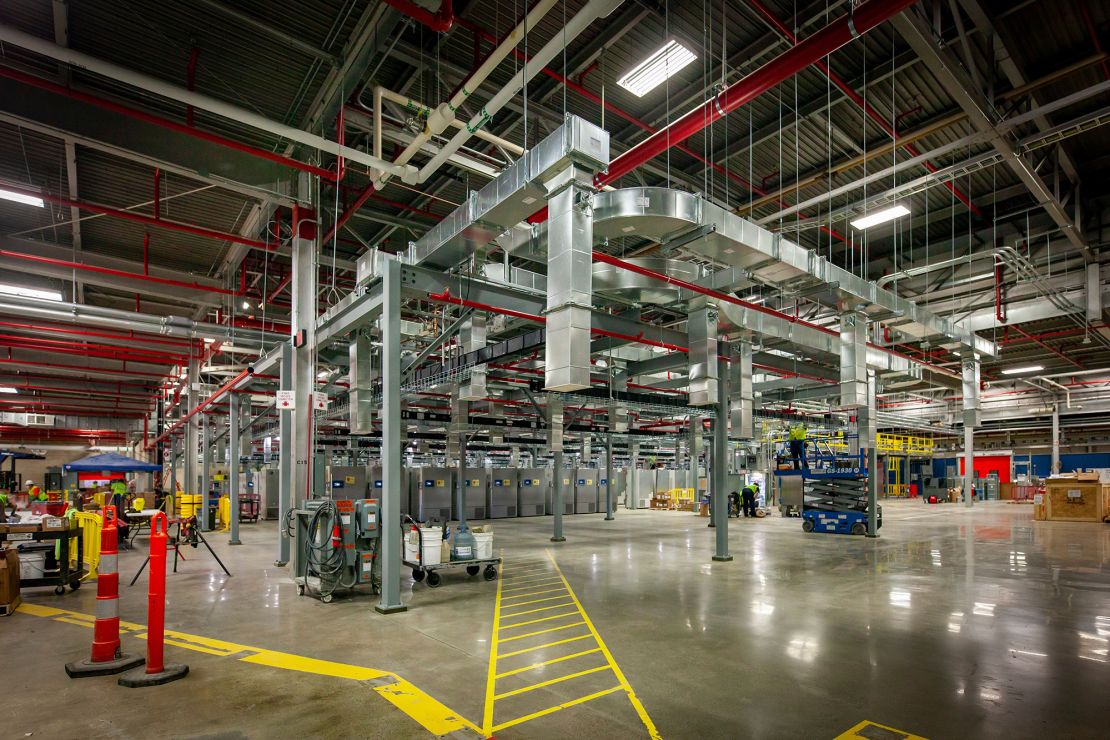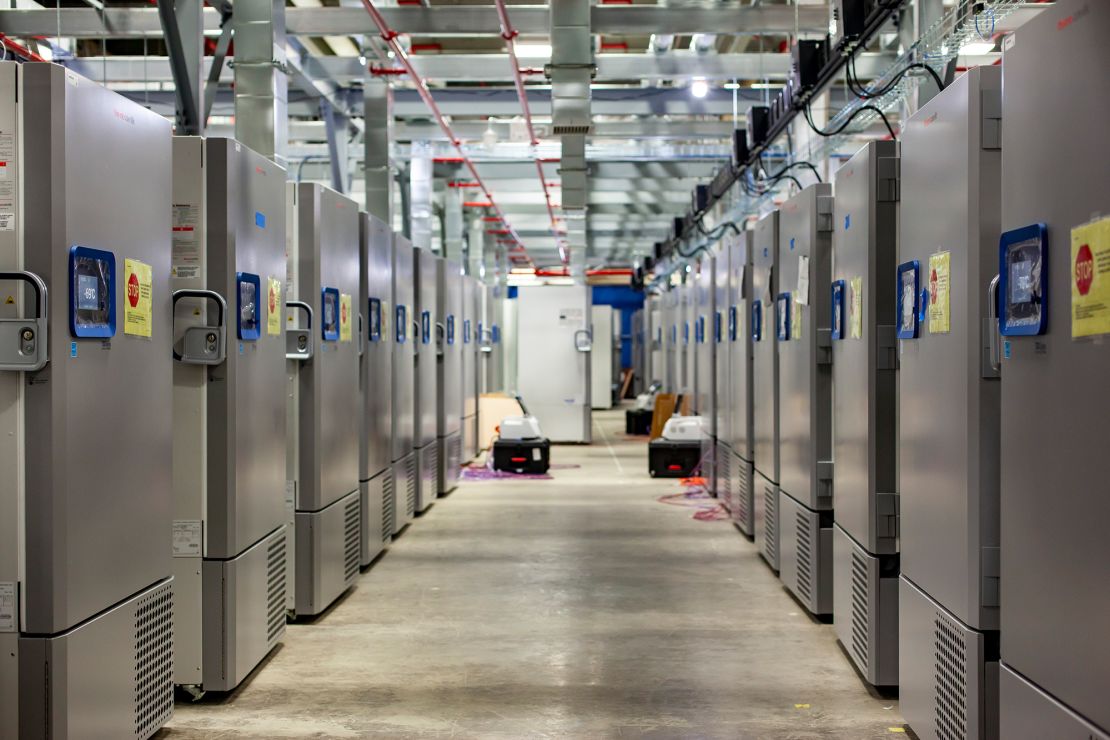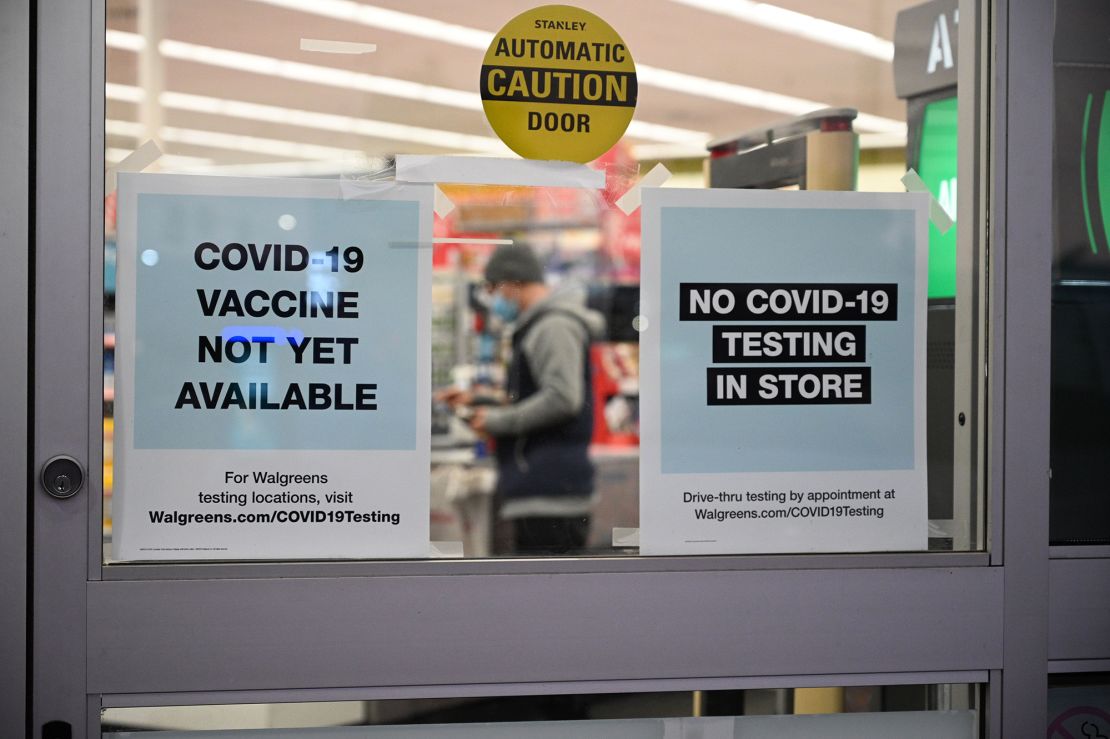In the fight against Covid-19, the US government is enlisting pharmacies to administer vaccines to hundreds of millions of Americans — an endeavor with unprecedented scale that presents a host of challenges for companies big and small across the United States.
Although some companies are ready to store and administer the Covid-19 vaccine, others aren’t.
Several companies are working on vaccines, each with its own particular storage and logistical challenges, and this is new territory for pharmacies, particularly when it comes to storing the Pfizer vaccine, which requires ultra-cold freezers.Drug stores, grocery stores and retailers are sorting through logistics, making space for the vaccines and buying special freezers in preparation.
Cold storage
Vaccines from some of the companies — such as AstraZeneca (AZN) and Moderna (MRNA) — only require standard refrigeration, to which many pharmacies already have access. But pharmaciesmust have ultra-cold storage units if they store and administer the Pfizer (PFE) vaccine that requires an environment of -70°C.
The special storage requirements of the Pfizer vaccine notwithstanding, grocery stores with pharmacies could have a leg up over traditional drug stores and independent pharmacies, because they already have storage space for the vaccines that only require standard refrigeration.

“Grocery stores will help support a more rapid rollout of a national vaccination program,” David Bishop, partner and analyst at retail and grocery consulting firm Brick Meets Click, told CNN Business. This is simply a function of capacity in grocery stores, Bishop said. Many of the grocers that already operate pharmacies have “much larger and existing storage areas, whether we’re talking in the backroom or on the sales floor,” he said.
But the Pfizer vaccine will be sent to pharmacies across the United States, and grocery stores and drug stores “absolutely are starting from scratch” when it comes to purchasing and using ultra-cold freezer units, said Gary Bissig, the vice president of LabRepCo, a firm that specializes in research appliances for the pharmaceutical industry.

The Pfizer vaccine will arrive in thermal shippers that can be used as temporary storage units when filled with dry ice. The vials last in those conditionsfor 15 days, according to a Pfizer statement, making it a good option for quick turnaround but not for long-term vaccine storage, which will likely be common.According to Pfizer’s instructions, the boxes can be opened only twice a day, and each time for no more than a minute.
The vaccine can also be stored at 2°C to 8°C in refrigeration units that are commonly available in hospitals, the company said, but the vials can only last in those conditions for five days.
Ultra-low-temperature freezers extend the vaccine’s shelf life for up to six months and could be useful in locations where clinicians feel that they might not move through the vaccine quickly.
Pharmacies have been administering flu vaccines and pneumococcal vaccines for many years now, but about 99% of pharmacies in the United Statesdo not have access to a -80°C freezer, Bissig said.
Bissig added that the ultra-cold storage units are traditionally purchased by “major hospitals” and “huge medical colleges” that use the freezers for research. “The application of this freezer is traditionally for drug discovery,” he highlighted. “It’s not for drug distribution.”
LabRepCo started building small -80°C units for small pharmacies and clinics as soon as it heard about the storage requirements for the Pfizer vaccine.
“Ultra-cold freezers will be an essential part of [Walgreens’] plan,” a Walgreens spokesperson told CNN. “We are exploring leveraging a combination of these ultra-cold freezers and dry ice storage solutions to support these medicines.”
CVS, however, is planning on using the Pfizer shipper containers instead of buying its own ultra-cold storage units. “We’d replenish the dry ice every five days for a total of 15 days,” a CVS spokesperson told CNN Business. The vials are then able to be refrigerated for an additional five. “Every dose would be utilized within that window,” the spokesperson said.
“We started to make them as fast as we could, but it wasn’t enough,” Bissig said. “These factories can’t grow to twice their normal size. All they can do is add more people and try to get more raw materials and supplies, and they’re doing the best they can.”
“The entire global demand for these products has swelled to an unsustainable level at this point,” he said.
Grocery store pharmacies are preparing, too, but many grocers’ plans for ultra-cold storage unit purchases are contingent upon when specific vaccines get authorized. If Pfizer’s vaccine is authorized first, stores will focus on acquiring and using ultra-cold storage.
“Supermarket pharmacies are well positioned to administer Covid-19 vaccines in a safe, convenient location when they are available,” Heather Garlich, VP at FMI, a trade group for food marketing, food retailers and wholesalers, told CNN Business. The group is currently in touch with large refrigeration providers in case there is a need for refrigeration beyond existing capacity.
Long lines

Storage isn’t the only problem. Managing potentially long lines at stores is another obstacle that pharmacies will likely have to overcome.
Some clinics are already testing out vaccine administrationstrategies with the flu vaccine while the pharmaceutical industry awaits US Food and Drug Administration approval. Brian Tanquilut, a healthcare stock analyst at Jeffries, highlighted a pilot program at a drive-thru clinic in Shreveport, Louisiana. He said the clinic is testing out drive-thru flu vaccinations to prepare for rolling out a drive-thru strategy for state-administered Covid-19 vaccines.
Similar to CVS’ Covid-19 testing operation, vaccines will be available to CVS customers by appointment only, and they can be booked through the CVS website or app.
“Think of it like a roundtrip ticket — you’ll book both doses at the same time, with a healthy number of reminders (texts, calls, etc.) before the first and second shot,” a CVS spokesperson told CNN Business. There will also be a dedicated 800 number for customers who don’t have online access.
Grocery chain Albertsons is also preparing for the vaccine. The company said once the Covid-19 vaccine is available, recipients will be able to fill out vaccine consent forms in the Albertsons pharmacy apps, reducing the amount of time spent at the pharmacy.
Which pharmacies will have the vaccine?
The US Department of Health and Human Services released a list of pharmacies that agreed to provide the vaccine when it’s available to the public. The list includes Albertsons, Costco, CVS, Publix, Rite Aid, Kroger, Walgreens, Walmart and Winn-Dixie, among others.
The government has essentially “put agreements in place with these retailers to make sure they can run vaccines through them,” said Tanquilut. It’s now up to those companies to figure out — in consultation with the government — which specific locations will administer the Covid-19 vaccine.
Even with high demand, some Walgreens and CVS locations won’t be administering the vaccine, Tanquilut said. He emphasized that not all CVS and Walgreens locations are doing Covid testing and the vaccination offerings will likely mirror that.
“It’s going to be selected, larger locations that are going to have those capabilities,” he added.
As for delivery, “it’s up to the government to figure out delivery because this is a highly allocated product,” Tanquilut said.
As it stands now, May is likely the soonest target for vaccinations for the general public. But it could happen in June or later, depending on what the Advisory Committee on Immunization Practices decides, what vaccine supply looks like and how smoothly distribution is going. Health care workers, nursing home residents, high-risk adults and essential workers are expected to have access to the vaccine starting in December.
CVS and Walgreens are preparing to be among the first to administer the Covid-19 shots in the United States, if the FDA authorizes emergency use. But those vaccinations would take place in long-term care facilities, not in retail stores, according to CVS and Walgreens.CVS pharmacists will be traveling to the facilities, similar to how they operate on-site seasonal flu clinics, the company said in an email to CNN Business.
Spokespeople for Kroger, Publix, Albertsons, Wegmans and Gristedes were not able to share details about purchasing ultra-cold storage units.
– CNN’s Naomi Thomas and Maggie Fox contributed to this report
























